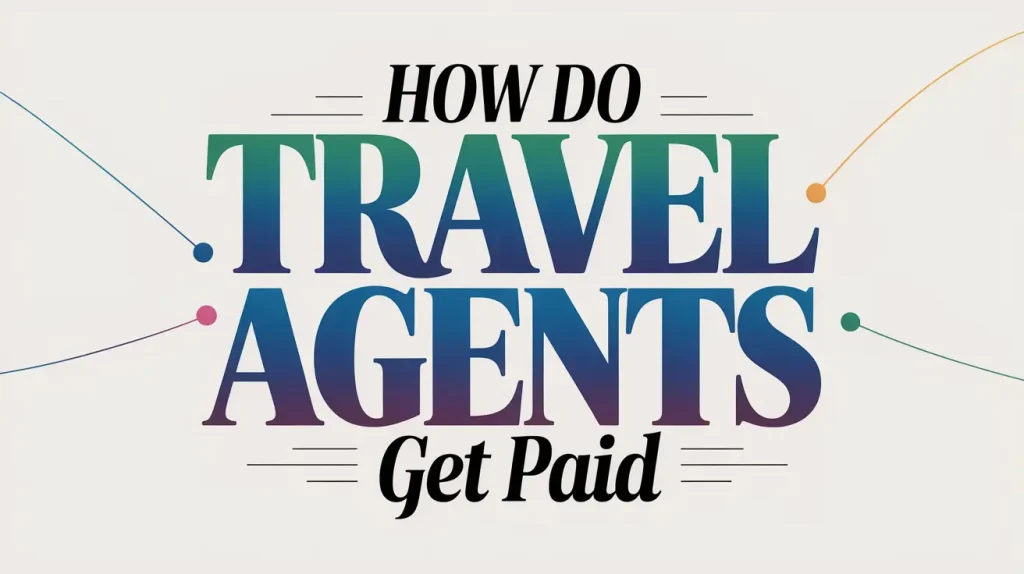The travel industry has changed dramatically over the years, yet one question still lingers for many travelers and aspiring agents alike: how do travel agents get paid? Whether they’re working independently or through a large agency, understanding how travel professionals earn income reveals why this career remains rewarding in 2025.
In this in-depth guide, we’ll explore the main ways travel agents make money, how commissions work, and what strategies help them maximize profits—all explained in simple, practical language.

Content
How Do Travel Agents Get Paid Through Their Business Model
Before exploring how do travel agents get paid, it’s essential to understand their business model. Travel agents serve as intermediaries between travelers and service providers such as airlines, hotels, and tour operators. They assist clients in planning, booking, and managing trips while earning income through commissions or service fees for their professional guidance.
Types of Travel Agents and How They Earn Income
There are several types of travel agents, each with its own income structure that explains how do travel agents get paid. Retail travel agents work in traditional agencies or storefront offices, earning commissions from bookings. Independent travel agents are self-employed professionals who collaborate with host agencies and retain a portion of the commission. Corporate travel agents handle business travel for organizations and often earn through contracts or service retainers. Online travel agents (OTAs) generate revenue through affiliate marketing and digital booking platforms.
If you’re wondering how do I become a travel agent, the first step is choosing which type of agent suits your goals—whether it’s retail, independent, corporate, or online—and then obtaining the necessary certifications, training, and industry partnerships to start earning effectively.
Main Ways Travel Agents Get Paid
So, how do travel agents earn money in today’s market? The answer depends on what they sell and how they structure their services. Let’s look at the main income sources.
1. Commissions from Suppliers

Traditionally, most travel agents earn through commissions paid by suppliers. When an agent books a hotel room, cruise, or vacation package, the supplier rewards them with a percentage of the sale—usually between 10% and 16%.
- Hotels and Resorts: Typically pay 10–15% commissions.
- Cruise Lines: Offer around 12–16%, depending on booking volume.
- Tour Operators: Often pay higher commissions, up to 20%, for packaged vacations.
Example: If an agent books a $5,000 cruise at a 12% commission, they earn $600 from that single booking.
This method remains the backbone of how travel agents get paid, particularly for those who specialize in luxury or group travel.
2. Service and Consultation Fees
Because airline commissions have declined over the years, many modern agents charge service fees to cover their expertise and time. These fees vary depending on the complexity of the trip:
- $25–$50 for flight-only bookings
- $100–$300 for detailed travel itineraries
- $250+ for luxury or customized tours
This approach ensures a steady income stream while maintaining professional value—especially when clients need tailored travel advice.
3. Net Rate Markups
Some agents receive net rates (wholesale prices) from suppliers and then apply a markup before offering it to clients.
For instance, if a resort offers a travel agent a net rate of $1,200 for a five-night stay, the agent might sell it for $1,400 and keep the $200 difference as profit.
This model gives independent travel agents flexibility to control pricing and earn fairly for their planning efforts.
4. Retainer or Contract-Based Payments
Corporate and high-end leisure agents often work under contractual agreements or monthly retainers with clients. These contracts guarantee income regardless of travel volume, providing stability.
For example, a company might pay a travel consultant a flat monthly fee to handle all employee travel, track expenses, and secure preferred rates.
5. Incentives and Bonuses
Beyond standard commissions, many suppliers offer incentives or bonus programs to agents who meet sales targets. This could include:
- Cash bonuses for booking certain hotel brands
- Complimentary travel experiences (known as “fam trips”)
- Higher commission percentages for achieving sales goals
These bonuses reward agents for loyalty and performance, motivating them to focus on quality partnerships.
How Much Do Travel Agents Actually Make?
Income varies widely depending on experience, niche, and volume of sales. On average, travel agents earn between $35,000 and $80,000 per year, with top performers exceeding six figures.
Those who specialize in luxury travel or group bookings tend to earn more due to higher transaction values and better commission rates.
Case Study: Real-Life Example
Maria, an independent travel consultant based in Florida, launched her boutique agency in 2020, specializing in destination weddings and group cruises. In 2024, she managed 15 destination weddings and 10 group cruises, each averaging $8,000 per trip. Her suppliers paid commissions of about 12–15%, and she also charged a $200 service fee per client for personalized coordination.
Here’s her annual income breakdown:
- Cruise Commissions: $12,000
- Wedding Packages: $15,000
- Service Fees: $5,000
- Total Income: $32,000 (part-time basis)
This real-life example illustrates how do travel agents get paid through a mix of supplier commissions and service fees, allowing Maria to transform her love for travel into a rewarding, flexible career.
Common Challenges in Travel Agent Payments
Even with multiple revenue streams, travel agents face a few payment challenges:
- Delayed Commissions: Some suppliers pay only after the client completes their trip, which can take months.
- Tracking Issues: Managing multiple bookings and payment dates can get complicated without proper software.
- Inconsistent Cash Flow: Seasonal fluctuations affect revenue, especially for leisure travel agents.
To manage these challenges, many agents use CRM and commission-tracking tools to ensure timely payments and accurate accounting.
Why Travel Agents Still Matter in 2025
With online booking platforms everywhere, some assume travel agents are outdated—but the truth is, they’re more relevant than ever.
Agents offer something no algorithm can: personalized expertise, insider connections, and human support. They save travelers time, reduce stress, and often find deals or upgrades unavailable to the general public.
More importantly, clients value trust. When flights are canceled or itineraries change unexpectedly, a travel agent’s guidance is priceless.
Tips to Maximize Earnings as a Travel Agent

Want to increase your income as a travel agent? Try these expert tips:
- Niche Down: Specialize in luxury travel, cruises, or destination weddings for higher commissions.
- Use Affiliate Programs: Earn extra income by sharing travel resources or booking links online.
- Leverage Technology: Tools like CRM platforms or booking automation software help track commissions and manage clients efficiently.
- Build Strong Supplier Relationships: Reliable partnerships often lead to higher commission tiers and exclusive bonuses.
Conclusion: Turning Passion into Profit
So, how do travel agents get paid? Through a combination of commissions, service fees, and strategic partnerships. Successful agents, including a Disney travel agent, often diversify their income sources to maximize earnings while delivering exceptional service. The key to success lies in diversification—earning from multiple sources while providing genuine value to clients.
For aspiring or active agents, the travel industry remains a dynamic, people-focused profession with limitless earning potential. Whether you’re booking a dream honeymoon, organizing a Disney vacation, or managing corporate itineraries, every trip you plan contributes to both your clients’ memories and your financial success.
FAQ’s:
How do travel agents make money if they don’t charge?
They earn supplier commissions or markups on bookings, even without charging direct client fees.
Do travel agents get paid by customers?
Sometimes, yes. Agents may charge service or planning fees for custom itineraries.
What are the disadvantages of using a travel agent?
Limited flexibility and small service fees are minor drawbacks compared to convenience.
How do personal travel agents get paid?
Personal agents earn through commissions, service fees, or contract-based payments.

Nelle Diamond has been to over 100 countries, has a penchant for all things food, and is also an experienced mountaineer. She loves nothing more than exploring the world on her own terms.



